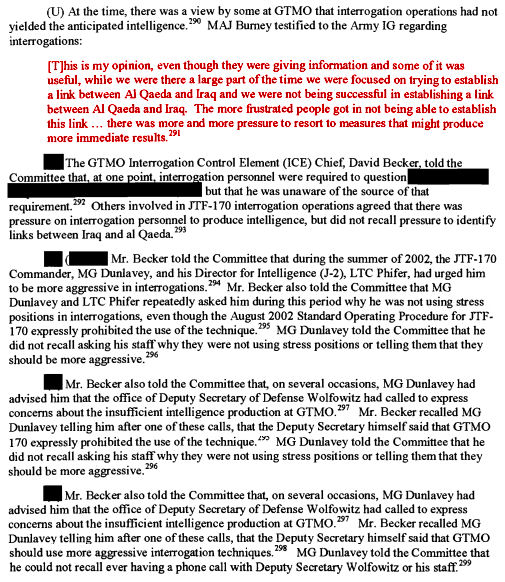| I believe this post is near the end of what I think about the Bush Administration’s invasion of Iraq. One doesn’t have to invoke a quest for oil to explain what they thought. We can just read what they said. By this time, most right-thinking people know that the distorted intelligence and their media campaign was an awkward justification [poorly executed] and not the reason. Throughout it all, they’ve thought their cause was just so what they did was right. It’s now for the American people to finally have a say. For me, I’ve said it enough times… |
A recent discussion with friend ShrinkRap sent me searching for Dick Cheney’s Interview on Meet the Press on September 8, 2002. It’s where he came out swinging about Iraq. But that wasn’t all of the news cycle that day. That morning, the infamous Judith Miller had an article in the New York Times. It was about the "Aluminum Tubes." Then came Cheney on NBC talking to Tim Russert. At noon, Condi Rice was on CNN with Wolf Blitzer.
If you read each one of these transcripts [below], you’ll be struck as I was that they are extremely Lite. They have their aluminum tubes story. They have Hussein’s behavior in 1991. But there’s almost nothing else. of substance. In Cheney’s piece, he connects al Qaeda and Hussein, but the connections are so vague and opaque that I didn’t bother to quote them. Maybe there would have been more "punch" in 2002 before we knew that everything they said was totally wrong, but I doubt it. The phrase that comes to mind is "much ado about nothing." There’s no mention of the Niger Yellowcake story. Tenant had nixed it as way "too fishy." It would resurface in October 2002 when the forger himself and the Italian Secret Service put it back on the table, but at least for September it was off the radar.
In March 2002, they’d captured
Abu Zubaydah and flown him to Thailand. He’d been interrogated there by F.B.I. agent,
Ali Soufan, using conventional techniques and by report he’d given them some valuable information. He was not the big fish they’d hoped for, and he is apparently a mentally ill man [Schizophrenia]. He is the specific reason for the Bybee Memo of August 1, 2002, although they’d started harsh interrogation [waterboarding] the week before on verbal approval from Bybee. In the
Bybee Memo, Jay Bybee [John Yoo] is responding to a request from some unknown person:
Our advice is based upon the following facts, which you have provided to us. We also understand that you do not have any facts in your possession contrary to the facts outlined here, and this opinion is limited to these facts. If these facts were to change, this advice would not necessarily apply. Zubaydah is currently being held by the United States. The interrogation team is certain that he has additional information that he refuses to divulge. Specifically, he is withholding information regarding terrorist networks in the United Stares or in Saudi Arabia and information regarding plans to conduct attacks within the United States or against our interests overseas. Zubaydah has become accustomed to a certain level of treatment and displays no signs of willingness to disclose further information. Moreover, your intelligence indicates that there is currently level of "chatter" equal to that which preceded the September 11 attacks. In light of the information you believe Zubaydah has and the high level of threat you believe now exists, you wish to move the interrogations into what you have described as an "increased pressure phase."
By report, they waterboarded Zubaydah 83 times during the month trying to extract whatever they were after.
It’s beginning to appear that what they were after was some kind of confirmation that al Qaeda and Hussein were working together, ergo Hussein was behind or involved with the 9/11 attack. That idea comes from this
Senate Armed Services Committee report:
Recall that Donald Rumsfeld had tasked Jim Haynes to talk to Paul Wolfowitz on the afternoon of 9/11 to look for connection [between Saddam Hussein, SH] and Osama Bin Laden [UBL].

And the
Senate Armed Services Committee reports that Wolfowitz was on the job, calling gitmo to complain about the lack of results, along with the better known efforts of his assistant Douglas Feith. Major Paul Burney is clear that the pressure to "
resort to measures that might produce more immediate results" had to do with establishing "
a link between Al Qaeda and Iraq." Apparently, it just didn’t work. By the end of the month, they didn’t have anything solid to back up their call for immediacy in attacking Iraq. All they had were some aluminum tubes that were easily discounted by our own scientists and the I.A.E.A., basic vague fear-mongering rhetoric, and Saddam Hussein’s history of being a class one jerk. That’s the way it felt to me back then, and that’s the way it feels to me now. Read them now and see if that’s how they come across to you…
More than a decade after Saddam Hussein agreed to give up weapons of mass destruction, Iraq has stepped up its quest for nuclear weapons and has embarked on a worldwide hunt for materials to make an atomic bomb, Bush administration officials said today. In the last 14 months, Iraq has sought to buy thousands of specially designed aluminum tubes, which American officials believe were intended as components of centrifuges to enrich uranium. American officials said several efforts to arrange the shipment of the aluminum tubes were blocked or intercepted but declined to say, citing the sensitivity of the intelligence, where they came from or how they were stopped.
The diameter, thickness and other technical specifications of the aluminum tubes had persuaded American intelligence experts that they were meant for Iraq’s nuclear program, officials said, and that the latest attempt to ship the material had taken place in recent months. The attempted purchases are not the only signs of a renewed Iraqi interest in acquiring nuclear arms. President Hussein has met repeatedly in recent months with Iraq’s top nuclear scientists and, according to American intelligence, praised their efforts as part of his campaign against the West.
Iraqi defectors who once worked for the nuclear weapons establishment have told American officials that acquiring nuclear arms is again a top Iraqi priority. American intelligence agencies are also monitoring construction at nuclear sites…
"The jewel in the crown is nuclear," a senior administration official said. "The closer he gets to a nuclear capability, the more credible is his threat to use chemical or biological weapons. Nuclear weapons are his hole card. The question is not, why now?" the official added, referring to a potential military campaign to oust Mr. Hussein. "The question is why waiting is better. The closer Saddam Hussein gets to a nuclear weapon, the harder he will be to deal with."
Hard-liners are alarmed that American intelligence underestimated the pace and scale of Iraq’s nuclear program before Baghdad’s defeat in the gulf war. Conscious of this lapse in the past, the they argue that Washington dare not wait until analysts have found hard evidence that Mr. Hussein has acquired a nuclear weapon. The first sign of a "smoking gun," they argue, may be a mushroom cloud.
Still, even though hard-liners complain that intelligence about Iraq’s program is often spotty, they plan to declassify some of it to make their case in coming weeks. The administration briefed members of Congress on Iraq’s programs to develop weapons of mass destruction this week, but it is not known to what extent officials talked about the intercepted shipments. Given the special intelligence-sharing relationship with Britain, the information on the attempted purchases Mr. Blair plans to release in a few weeks…
MR. RUSSERT:Let me turn to the issue of Iraq. You have said that it poses a mortal threat to the United States. How? Define mortal threat.
VICE PRES. CHENEY: … What we found on September 11 is that the danger now is an attack that’s launched from within the United States itself, not from some foreign territory, as happened with respect to the hijackers on 9/11. Also that, in this particular case, it was backed up by a cell, terrorist cell, operating in Hamburg, Germany. You have to completely recalibrate your thinking in terms of how you deal with that. Now, if you start with that as background, then you deal with Saddam Hussein and his 11 years, now, since 1991, since the end of the war, his refusal to comply with the U.N. Security Council resolutions. If you look at the extent to which he has aggressively sought to acquire chemical, biological and nuclear weapons, over the years, the fact that he has previously used them – he used chemical weapons both against the Kurds and against the Iranians during the 1980s – the fact that he has twice invaded his neighbors. He’s launched ballistic missiles against four of his neighbors over the years. There’s a pattern and a track record there that one has to be concerned about.
Now, the more recent developments have to do with our now being able to conclude, based on intelligence that’s becoming available, some of it has been made public, more of it hopefully will be, that he has indeed stepped up his capacity to produce and deliver biological weapons, that he has reconstituted his nuclear program to develop a nuclear weapon, that there are efforts under way inside Iraq to significantly expand his capability…
The sanctions are breaking down. The willingness of nations to trade with Saddam Hussein is increased. He’s also sitting on top of about 10 percent of the world’s oil reserves and generating enough illicit oil revenue now on the sides that he’s got a lot of money to invest in developing these kinds of programs. So we find ourselves, on the one hand, with the demonstrated greater vulnerability of September 11; and, on the other hand, with the very clear evidence that this is a man who is resuming all of those programs that the U.N. Security Council tried to get him to forgo some 10 or 11 years ago. And increasingly we believe that the United States may well become the target of those activities.
MR. RUSSERT: What, specifically, has he obtained that you believe would enhance his nuclear development program?
VICE PRES. CHENEY: Well, in the nuclear weapons arena, you’ve got sort of three key elements that you need to acquire. You need the technical expertise. You need to have a group of scientists and technicians, engineers, who know how to put together the infrastructure and to build a weapon. He’s got that. He had it because of his program that was there previously, which I’ll come back and talk about in a minute, but we know he’s been working for 20 years trying to acquire this capability. He’s got a well-established scientifically, technically competent crew to do it.
Secondly, you need a weapons design. One of the toughest parts about building a nuclear weapon is knowing how to do it. And they’ve got that. He had it back prior to the Gulf War. We know from things that were uncovered during the course of the inspections back in the early ’90s that he did, in fact, have at least two designs for nuclear weapons.
The third thing you need is fissile material, weapons-grade material. Now, in the case of a nuclear weapon, that means either plutonium or highly enriched uranium. And what we’ve seen recently that has raised our level of concern to the current state of unrest, if you will, if I can put it in those terms, is that he now is trying, through his illicit procurement network, to acquire the equipment he needs to be able to enrich uranium to make the bombs.
MR. RUSSERT: Aluminum tubes.
VICE PRES. CHENEY: Specifically aluminum tubes. There’s a story in The New York Times this morning – this is – I don’t – and I want to attribute The Times. I don’t want to talk about, obviously, specific intelligence sources, but it’s now public that, in fact, he has been seeking to acquire, and we have been able to intercept and prevent him from acquiring through this particular channel, the kinds of tubes that are necessary to build a centrifuge. And the centrifuge is required to take low-grade uranium and enhance it into highly enriched uranium, which is what you have to have in order to build a bomb. This is a technology he was working on back, say, before the Gulf War. And one of the reasons it’s of concern, Tim, is, you know, we know about a particular shipment. We’ve intercepted that. We don’t know what else-what other avenues he may be taking out there, what he may have already acquired. We do know he’s had four years without any inspections at all in Iraq to develop that capability.
And we also, if you harken back to the past, as I mentioned earlier, before the Gulf War, back in 1990, we had reason to believe then that he had established a program to try to produce a nuclear weapon. I was told then, as secretary of Defense, that he was several years away from being able to do that. What we found out after the Gulf War, once we got in there, and got the inspection regime going and so forth, was that he had been much farther along than we anticipated, and that he, in fact, might have been within six months to a year of actually building a nuclear weapon.
MR. RUSSERT: Do…
VICE PRES. CHENEY: So the point that-to be made here is we have to assume there’s more there than we know. What we know is just bits and pieces we gather through the intelligence system. But we-you never-nobody ever mails you the entire plan or-that rarely happens. It certainly has not happened in this case. So we have to deal with these bits and pieces, and try to put them together in a mosaic to understand what’s going on. But we do know, with absolute certainty, that he is using his procurement system to acquire the equipment he needs in order to enrich uranium to build a nuclear weapon.
MR. RUSSERT: He does not have a nuclear weapon now?
VICE PRES. CHENEY: I can’t say that. I can say that I know for sure that he’s trying to acquire the capability. But again, you know, if this-some people say, “Well, if you’re going to use this process, if you’re going to go through the enrichment process, it could take five, six years maybe.” But then the question is: “Well, when did he start?” Did he start back when the inspection regime was still under way, prior to ’98? Because he did have, for example, a robust biological weapons program then, even though there were inspectors present. Did he start in ’98 when the inspectors left? Has he had four years already to work on this process? Or is he only beginning now? We don’t know that. We can’t tell what the start date is. We do know that he is, in fact, embarked upon this venture. We don’t have any way to know, at this point, to specify the date by which he will actually have a weapon he can use.
BLITZER: Based on what you know right now, how close is Saddam Hussein’s government – how close is that government to developing a nuclear capability?
RICE: You will get different estimates about precisely how close he is. We do know that he is actively pursuing a nuclear weapon. We do know that there have been shipments going into Iran, for instance – into Iraq, for instance, of aluminum tubes that really are only suited to – high-quality aluminum tools that are only really suited for nuclear weapons programs, centrifuge programs.
We know that he has the infrastructure, nuclear scientists to make a nuclear weapon. And we know that when the inspectors assessed this after the Gulf War, he was far, far closer to a crude nuclear device than anybody thought, maybe six months from a crude nuclear device. The problem here is that there will always be some uncertainty about how quickly he can acquire nuclear weapons. But we don’t want the smoking gun to be a mushroom cloud.
I’ve always wondered why the Administration was so determined to include the Niger Forgeries in Bush’s SOTUS, the famous "sixteen words." I think now that they’d tried everything in the book to tie al Qaeda to Hussein and failed [including torture]. The only justification left to them was the dangerous weapons they they fanticized finding in Iraq. The most sympathetic interpretation is that we invaded Iraq on a guess. The most likely interpretation is that we invaded Iraq because they wanted to…
This is what they gave as their reason for wanting to [in 1998]:

January 26, 1998
The Honorable William J. Clinton
President of the United States
Washington, DC
Dear Mr. President:
We are writing you because we are convinced that current American policy toward Iraq is not succeeding, and that we may soon face a threat in the Middle East more serious than any we have known since the end of the Cold War. In your upcoming State of the Union Address, you have an opportunity to chart a clear and determined course for meeting this threat. We urge you to seize that opportunity, and to enunciate a new strategy that would secure the interests of the U.S. and our friends and allies around the world. That strategy should aim, above all, at the removal of Saddam Hussein’s regime from power. We stand ready to offer our full support in this difficult but necessary endeavor.
The policy of “containment” of Saddam Hussein has been steadily eroding over the past several months. As recent events have demonstrated, we can no longer depend on our partners in the Gulf War coalition to continue to uphold the sanctions or to punish Saddam when he blocks or evades UN inspections. Our ability to ensure that Saddam Hussein is not producing weapons of mass destruction, therefore, has substantially diminished. Even if full inspections were eventually to resume, which now seems highly unlikely, experience has shown that it is difficult if not impossible to monitor Iraq’s chemical and biological weapons production. The lengthy period during which the inspectors will have been unable to enter many Iraqi facilities has made it even less likely that they will be able to uncover all of Saddam’s secrets. As a result, in the not-too-distant future we will be unable to determine with any reasonable level of confidence whether Iraq does or does not possess such weapons.
Such uncertainty will, by itself, have a seriously destabilizing effect on the entire Middle East. It hardly needs to be added that if Saddam does acquire the capability to deliver weapons of mass destruction, as he is almost certain to do if we continue along the present course, the safety of American troops in the region, of our friends and allies like Israel and the moderate Arab states, and a significant portion of the world’s supply of oil will all be put at hazard. As you have rightly declared, Mr. President, the security of the world in the first part of the 21st century will be determined largely by how we handle this threat.
Given the magnitude of the threat, the current policy, which depends for its success upon the steadfastness of our coalition partners and upon the cooperation of Saddam Hussein, is dangerously inadequate. The only acceptable strategy is one that eliminates the possibility that Iraq will be able to use or threaten to use weapons of mass destruction. In the near term, this means a willingness to undertake military action as diplomacy is clearly failing. In the long term, it means removing Saddam Hussein and his regime from power. That now needs to become the aim of American foreign policy.
We urge you to articulate this aim, and to turn your Administration’s attention to implementing a strategy for removing Saddam’s regime from power. This will require a full complement of diplomatic, political and military efforts. Although we are fully aware of the dangers and difficulties in implementing this policy, we believe the dangers of failing to do so are far greater. We believe the U.S. has the authority under existing UN resolutions to take the necessary steps, including military steps, to protect our vital interests in the Gulf. In any case, American policy cannot continue to be crippled by a misguided insistence on unanimity in the UN Security Council.
We urge you to act decisively. If you act now to end the threat of weapons of mass destruction against the U.S. or its allies, you will be acting in the most fundamental national security interests of the country. If we accept a course of weakness and drift, we put our interests and our future at risk.
Sincerely,
Elliott Abrams Richard L. Armitage William J. Bennett
Jeffrey Bergner John Bolton Paula Dobriansky
Francis Fukuyama Robert Kagan Zalmay Khalilzad
William Kristol Richard Perle Peter W. Rodman
Donald Rumsfeld William Schneider, Jr. Vin Weber
Paul Wolfowitz R. James Woolsey Robert B. Zoellick


 The recent political cycle has brought us some important new ways of thinking. At first glance, they seem less lofty, more like political "campaign techniques." Two prominant versions are Drew Weston, author of The Political Brain and George Lakoff who wrote, Thinking points: Communicating Our American Values and Vision [and a lot of other books]. Lakoff is a professor of Cognitive Linguistics at Berkeley and a former student of Noam Chomsky. Trying to discuss his ideas gets pretty heady. For example:
The recent political cycle has brought us some important new ways of thinking. At first glance, they seem less lofty, more like political "campaign techniques." Two prominant versions are Drew Weston, author of The Political Brain and George Lakoff who wrote, Thinking points: Communicating Our American Values and Vision [and a lot of other books]. Lakoff is a professor of Cognitive Linguistics at Berkeley and a former student of Noam Chomsky. Trying to discuss his ideas gets pretty heady. For example: Since retiring, we’ve done a lot of travelling, and we’ve also adapted our t.v. watching to those discovery channel history channel programs that explore archeology, or some previous society. I remember one about Easter Island. It was focused on the disappearance of the island’s people. As I recall it, they had a fairly solid case that the islanders had used up all the trees in the process of making their statues on their little island. Then came erosion, no crops, food shortage, wars and maybe cannibalism, until they were near extinction. A lot of the stories of primitive civilizations end up with a similar story line. Some group builds a civilization, but something about the way they do things destroys their resources and away they go – quickly or slowly. That’s not the only way societies rise and fall as we know. Besides outgrowing resources, there’s outgrowing the power structure, or outgrowing religion, or wars, or disease. Human beings are pretty adept at not forming societies that survive.
Since retiring, we’ve done a lot of travelling, and we’ve also adapted our t.v. watching to those discovery channel history channel programs that explore archeology, or some previous society. I remember one about Easter Island. It was focused on the disappearance of the island’s people. As I recall it, they had a fairly solid case that the islanders had used up all the trees in the process of making their statues on their little island. Then came erosion, no crops, food shortage, wars and maybe cannibalism, until they were near extinction. A lot of the stories of primitive civilizations end up with a similar story line. Some group builds a civilization, but something about the way they do things destroys their resources and away they go – quickly or slowly. That’s not the only way societies rise and fall as we know. Besides outgrowing resources, there’s outgrowing the power structure, or outgrowing religion, or wars, or disease. Human beings are pretty adept at not forming societies that survive.







